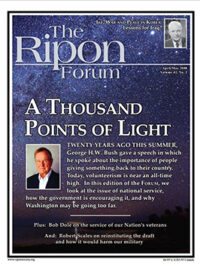When George H.W. Bush took office as President in 1989, he inherited a country that stood atop the world stage. Economically, the nation was prosperous. Globally, the fall of the Berlin Wall was less than a year away. Times were good.
Yet there was also an undercurrent that many in America were struggling to get by. Then-Vice President Bush identified this sentiment in his acceptance speech at the 1988 Republican National Convention. “There are people who haven’t tasted the fruits of the [economic] expansion,” he stated. “And we have to help them.”
He laid out a vision that involved, among other things, people stepping forward to help those in need. A “Thousand Points of Light” he called them. Service and volunteerism became hallmarks of his Administration. They remain part of his legacy today. Indeed, volunteerism is at or near an all-time high, and the issue of national service has widespread support.
But a downside emerged from all of this. It involved the federal government. What started as a modest proposal that encouraged people to volunteer through the Points of Light program in the first Bush Administration became a more ambitious and expensive program under President Clinton. Called AmeriCorps, it was criticized by many for paying volunteers to work. While the program has changed considerably under the current administration, concerns over the government’s role in encouraging service and volunteership remain.
We examine this issue and take a look at these concerns in this edition of the Forum. In that regard, we are honored to feature a statement from former President Bush on his continuing support for service to America. We are also very pleased to feature an essay by former Senate Majority Leader Bob Dole about our Nation’s Veterans, whose sacrifice will be honored on Memorial Day and whose service is beyond dispute.
Among other topics, this edition of the Forum also looks at the risks of reinstituting the draft with retired Major General Bob Scales. And author/professor Chester Pach examines President Eisenhower’s handling of the Korean conflict and whether any lessons can be learned with regard to the conflict in Iraq.
We hope you enjoy this edition and, as always, encourage you to write to editor@riponsociety.org with any thoughts or comments you may have.
Bill Frenzel
Chairman Emeritus
Ripon Society




